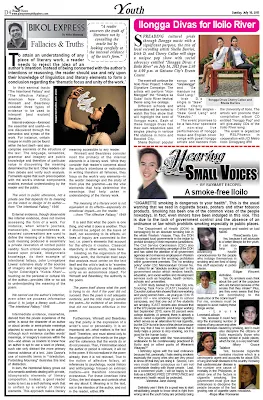 |
| wikimedia.org |
The first part compares poets and critics—and comes with pieces of advice for critics— as the general qualities needed by the critic can be found in the first one hundred couplets. After presenting knowledge of nature in its general forms—defining nature which needs of both wit and judgment to conceive it, Pope famously declares—
Learn hence for Ancient Rules a just Esteem;
To copy Nature is to copy Them.
“Classic texts, like Nature are a standard and guide. Their balance, harmony and good proportion are evident in their parts as well as demonstrated in the whole. In other words, Wit is Nature—for it instances something that we have all thought but whose sheer truth the poet now makes compelling through his language:”
True Wit is Nature to Advantage drest,
What oft was Thought, but ne’er so well exprest,
Something whose truth convinces at Sight we find
That gives us back the Image of our Mind. (297–300)
In itself a compendium of critical principles—or a sophisticated, witty poem with much reading and reflection in it, Essay on Criticism showcases Pope’s own view of literary borrowing—thus: Poets, like merchants should repay with something of their own what they take from others, not, like pirates, make prizes of all they meet.”
The neoclassicist creed, according to Pope, therefore is to imitate the ancient authors and to adopt the critical precepts that these authors and their texts embody. Two directions are afforded by this concept of imitation. First is the more self-conscious and restricted side based on authority and passed models that leads to the writing of imitations. Art's first requirement is its direct appeal to reason or pasion.
Second has to do with the broader side that rejects them by placing truth to general nature. The more universal and far-reaching the truth desired or conveyed by art, the closer art comes to fulfilling its primary aim. And as interpreter of Nature, then, the poet must divest himself of the prejudices of his age and country, in order to grasp and disclose general truths, which will always be the same.
This is followed by the practical laws for the critic in the second part. This includes, for instance, the critic’s prerogative to seek the author’s aim and the critic’s fallibility in mistaking the part of a literary for the whole. Pope tirades critics who do not only come up with partial readings, but also those who are proud and arrogant.
The third part—essayed out from lines 560 to the end of the concerns with the ideal character of the critic. Perhaps echoing the moral uprightness advanced by the Roman Horace, Pope deems it proper for the critic to have the qualities of integrity, modesty, tact and even courage. This calls for the concern for the critic to be morally liable—which translates that the critic can be the ordinary man—whose uplift is chief concern.


